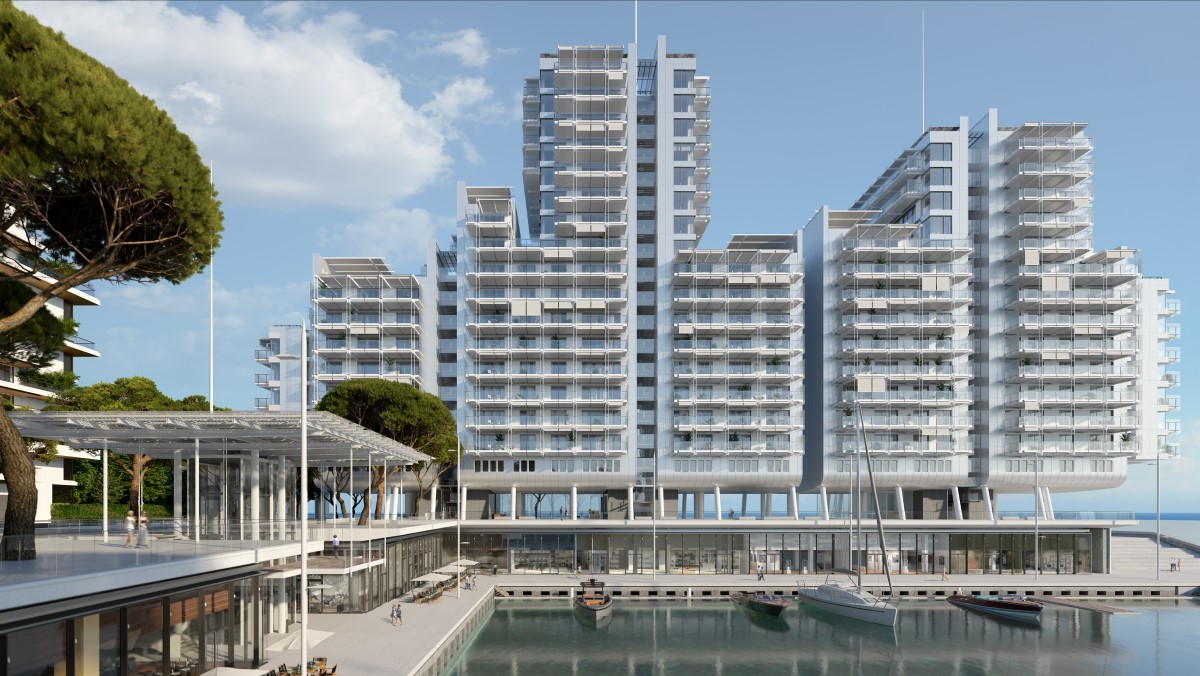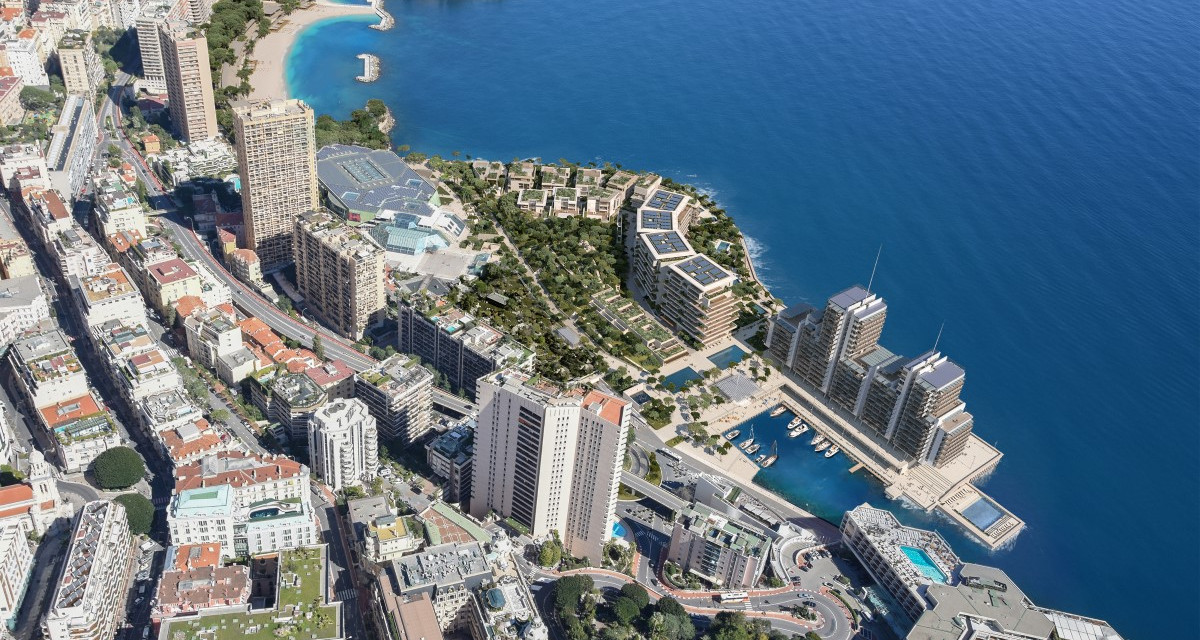Allied with its favourable tax laws, and the security and privacy that the principality can provide, ambitious new development schemes have piqued interest in Monaco property. We investigate the factors bringing new buyers to market.
Words: Will Moffitt
For a bird’s-eye view of Monaco’s ambitious development strategy, head up to the hilly green pastures of Roquebrune-Cap-Martin. On a clear day from this idyllic spot you can see the miles of crystal blue sea rolling back to meet a fast-changing city. The cranes dotted around the principality’s skyline show this land-constrained state – that was predominantly built during the 1950s – following through on its mission to build better and raise higher.
Delivering high-rise villas and apartment blocks to keep up with a swelling demand for new properties is a well-documented priority in the principality, particularly in Monaco’s central districts, but other strategies are also in place to ensure supply meets demand.
Take Mareterra. Part of a six-hectare reclamation project located off the coast between Monte Carlo and Larvotto, the largely pedestrianised district part-designed by Pritzker Prize-winning architect Renzo Piano, encompasses a lushly-planted park, an elegant waterfront promenade, and a small port. The project, which is due to be completed in 2025, will include 110 apartments, along with 10 villas – six of which will be located directly on the waterfront. It will boost Monaco’s land mass by three per cent and deliver an enviable eco-friendly playground for the ultra wealthy.
“The level and pace of investment in Monaco is changing,” Edward de Mallet Morgan, head of Knight Frank’s global super prime residential team, tells me.
“Mareterra is not necessarily that well known globally. But it’s by far the most expensive residential development scheme, from a sales perspective, in the world, given that prices have been nudging towards, if not over, the €100,000 per square metre threshold.”
Indeed, a major factor driving Monaco’s grand expansion plans is the need to cater to the growing influx of ultra high-net worth [UHNW] individuals with refined and expensive tastes. Knight Frank predicts that the number of Monaco residents with a net orth (including their primary residence) of more than $30 million will increase 23 per cent in the next four years. Meanwhile, the number of dollar millionaires in Monaco will increase 43 per cent.
“Obviously people go to Monaco, first and foremost, for tax purposes, but they also want to make sure they’re moving to somewhere that their families can have an amazing lifestyle,” de Mallet Morgan says. “I think having access to the sea and access to the Riviera within an hour’s drive is a factor. The lifestyle benefits have been undervalued in many ways in Monaco for a while, and people are just starting to wake up to the benefits of living in the region.”
Age and demographic are also reshaping priorities with younger families, many from the UK, Scandinavia, Germany and Switzerland, settling in Monaco. In particular, this has put a greater onus on the principality’s mission to build on its established tradition of providing high-class educational opportunities. To cater to this growing demand, a new British school is due to open in Monaco this September.
Meanwhile, Bay House, another hotly anticipated mixed-use development scheme with luxury apartments and rooftop villas, will house the relocated International School of Monaco.
“Monaco wasn’t nearly as well set up for family living, even 10 years ago, as it is today,” says de Mallet Morgan. “We can take quite a good temperature test purely by the fact that there’s increasing competition for school places, which is something that you hadn’t necessarily seen before.”
Led by Prince Albert II, Monaco has been a consistent advocate for green credentials and aims to be carbon neutral by 2050. In particular, the principality has sought to transition to electric power, investing heavily in eco-friendly alternatives to fossil fuelpowered cars. While a small but growing fraction of ordinary vehicles in Monaco are electric or hybrids, half of its administrative vehicles are harnessing these greener forms of energy.
Meanwhile, new builds like Mareterra are showcasing the eco-conscious methods that have informed their design choices.
The luxury offshore extension will use recycled seawater to supply the heat pumps used in the buildings for the production of hot water and the operation of the air conditioning systems. Meanwhile, the roofs of the apartment buildings will be equipped with rainwater harvesting systems that will be used to water the project’s green spaces. A network of photovoltaic panels will also be integrated into the buildings to harness solar power. According to the project’s website, this ‘should cover 40 per cent of the eco-district’s needs’.
These improvements to its infrastructure, coupled with drastic rises in inflation and rising tax levels elsewhere, are enhancing Monaco’s appeal. Alongside its enticing development portfolio, these socio-economic considerations have only strengthened its residential property sector.
“We’re certainly beginning to see quite a bit of life in the market,” says Irene Luke, partner at Savills Monaco. “People are beginning to think ahead about where they want to base themselves going forward, as a recession might be looming on the horizon elsewhere. Monaco is always a safe place for capital. That was certainly the case during the pandemic and I think that will continueto be true.”
As Luke clarifies, not only have places such as Mareterra piqued interest, but they havealso helped the rental or short-stay segment by bringing outside buyers to the region before these projects are finished.
Ultimately, it seems that a confluence of socio-economic factors and fast-paced development work – aligned with Monaco’s reputation as a sunny place for globalists to seek refuge – have strengthened the principality’s standing in the eyes of investors.
“I think that the lights of Monaco have got plenty to shine for in the future,” de Mallet Morgan says. “Monaco will continue to evolve and it will continue to be somewhere people increasingly want to live, even if they may not have considered it in the past.”
“Monaco is going to hold its head up,” Luke says.” The great thing about Monaco is that it is so small, and therefore it will remain desirable, particularly to the ultra wealthy.
“It’s prestigious in terms of the facilities that it offers. It has a tax regime that is very stable and unlikely to change. I’m feeling very optimistic about it.”









